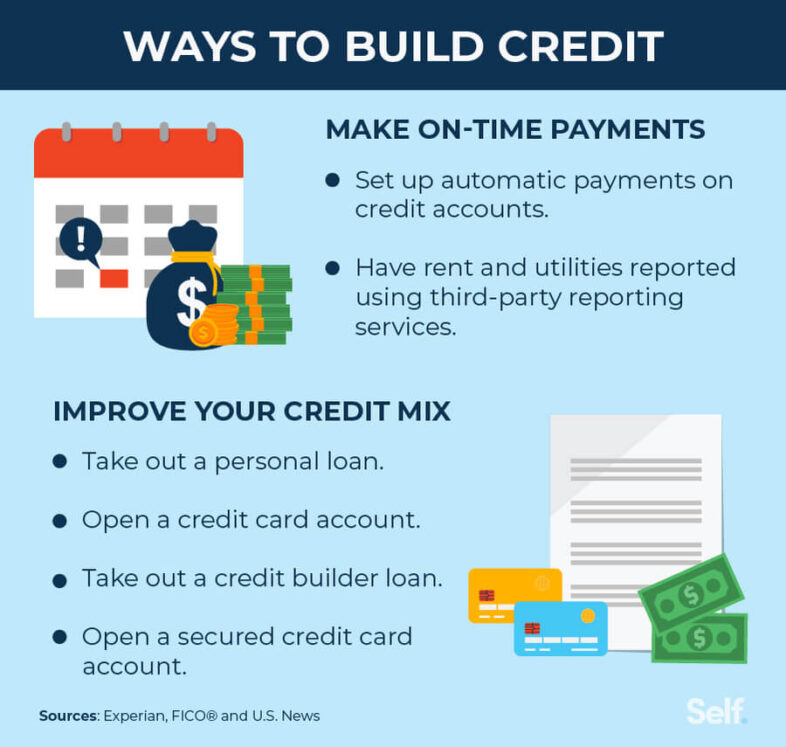From Experian.com one of the 3 Credit Bureaus
Your credit score is important. The higher your credit rating, the better your chances of being accepted for credit at the best rates. It can influence your ability to get things like credit cards, loans, mortgages, mobile contracts and more.
Looking for tips on how to improve your credit score? Try following the steps below.
10 tips to improve your credit score
- Prove where you live
Register on the electoral roll at your current address – you can do this even if you’re in shared accommodation or living at home with your parents. - Build your credit history
Having little or no credit history can make it difficult for companies to assess you, and your credit score may be lower as a result. This is a common problem for young people and people who are new to the country. Luckily, there are some steps you may be able to take to build up your credit history. - Make regular payments on time
Paying your accounts on time and in full each month is a good way to show lenders you’re a reliable borrower, and capable of handling credit responsibly. Old, well-managed accounts will usually improve your score – although be sure to read about the potential impact of unused credit cards. - Keep your credit utilisation low
Your credit utilisation is the percentage you use of your credit limit. For example, if you have a limit of £2,000 and you’ve used £1,000 of that, your credit utilisation is 50%. Usually, a lower percentage will be seen positively by lenders, and will increase your credit score as a result. If possible, try and keep your credit utilisation below 30%. - See if you could get an instant score boost
By securely connecting your current account to your Experian account, you can show us how well you manage your money. We’ll look for examples of your responsible financial behaviour, such as paying your Netflix, Spotify and Council Tax on time, and paying into savings or investment accounts. We’ll share a summary of your boosted data with participating lenders when you search or apply for credit. Find out more about Experian Boost and see if you could instantly improve your credit score. - Check for errors and report any mistakes on your report
Even small mistakes, such as a mistyped address, can affect your score and could be enough for a lender to refuse you credit. It’s worth checking your credit report to make sure all the information on it is accurate and up to date.If you do spot a mistake, contact the provider directly and ask them to change it. If you need help, we can raise a dispute with them on your behalf. If there is negative information that is correct but occurred during special circumstances (such as a period in hospital or losing your job) you can ask us to add a Notice of Correction to your credit report explaining this. - Monitor your credit file for fraudulent activity
If fraudsters gain access to your personal details, they could take out credit in your name without you being aware. If you see something on your credit report that is wrong, such as an application you don’t recognise, Experian’s specialist fraud support team can help. See what to do if you’ve been a victim of identity fraud. - Avoid moving home a lot if you can
This isn’t always possible to avoid, but it’s worth bearing in mind that lenders like to see stability in your circumstances. Moving home frequently may make lenders think you could be having trouble paying rent, for example. Find out why your address is an important part of your credit history. - Keep old accounts open and show a long credit history
It can be good to show lenders that you can successfully manage multiple credit accounts, especially over a long period of time. Most credit scoring models tend to reward you for having long-standing, mature credit accounts, and for only using a small portion of your credit limit. For more information, see our guide on what to do with unused credit cards. - Consider getting a credit builder card
If you’re looking to improve your credit rating, then a credit builder card can help rebuild your credit score. They typically have low spending limits and high interest rates. When you first get a credit card, it might briefly cause your score to drop. But used well, it can help you build your score over time.Credit builder cards can be effective if you use them for a small amount of spending each month (on everyday essentials you were going to buy anyway). Then make sure you repay the card on time and in full each month to avoid paying interest.
Why should I improve my credit score?
When you apply for credit, the lender will calculate your credit score to help it decide whether to lend to you. It’s usually based on:
- Information from your credit report.
- Your application details.
- Data they already hold on you, if you’ve been a customer before.
Each lender may have a different way of calculating your credit score, depending on what information they have access to and their lending criteria.
Credit reference agencies (CRAs) like Experian also calculate credit scores, for lenders and the public. You can get an idea of how lenders may view your credit history by looking at your free Experian Credit Score. And don’t worry, checking your score won’t affect it.
How can improving my credit score benefit me?
A higher credit score means companies see you as a lower risk, so you’re more likely to be approved for credit. This is because a high score indicates you have a history of managing your credit responsibly, such as making any repayments on time.
The benefits of improving your score may include:
- Better chance for credit card, mortgage and loan approval
Whether it’s a loan, credit card or mortgage you’re after, a higher credit score means you’ll have a better chance of being approved. You may also be able to choose from a wider range of credit offers and providers, which can help save you money. - Lower interest rates
If lenders think you’re lower risk, they may offer you better interest rates on loans and credit cards, which can make borrowing cheaper. A good credit score can improve your chances of beinng approved for a low interest loan or a 0% spending card, for example. - Better car insurance rates
If you choose to spread the cost of insurance over a year, your credit score can affect the interest charges you pay in addition to your insurance premium. - Higher credit limits
If you improve your score, you should have a better chance of borrowing larger amounts. This could help you achieve goals faster, such as buying a new car or making home improvements.
How long does it take to improve your credit score?
It depends on a number of things, but you should know it won’t happen overnight. Information about things like your new bank account or credit card can take several weeks to appear on your credit report, so it may take at least this long to see real improvements to your score. You may also need to wait for new accounts to mature a little (for example, for a few months) before they start to help your credit score.
Paying your accounts regularly and on time will improve your score as you build a credit history. Missed payments, defaults and court judgments will stay on your credit report for six years. However, the impact of any missed payments or defaults will likely reduce as the record ages. After six years they will be deleted from your report altogether.
4 tips to keep your credit score healthy
- Limit credit applications
Applying for credit frequently in a short space of time can make lenders think you’re overly reliant on credit and therefore a higher risk. It doesn’t matter what form of credit you apply for, or how much you’re asking to borrow – each application will record a hard search on your report which companies can see. So, try to space out any credit applications – a good rule of thumb is no more than one every three months, but remember lenders’ criteria can vary. - Avoid defaulted accounts
Defaulted accounts usually occur when your relationship with the company has broken down, usually because you’ve missed several expected payments. Defaulted accounts can have a significant impact on your credit score - Only borrow what you can afford
Getting into trouble with debt may lead to things like County Court Judgements (CCJ), an Individual Voluntary Agreements (IVA) or even bankruptcy. These things will stay on your credit report for at least six years and will have a significant, negative impact your credit score. - Keep an eye out for fraudsters
Keeping a close eye on your credit report and looking out for any signs of fraudulent activity could help protect your credit score. If you see a surge in the amount you owe, or any applications you didn’t make, you may be a fraud victim. Note that if you do become a victim of fraud, your lenders should fix any damage to your credit report quickly, once they’ve investigated and established the facts. We can help you correct your credit report following fraud if you get in touch



